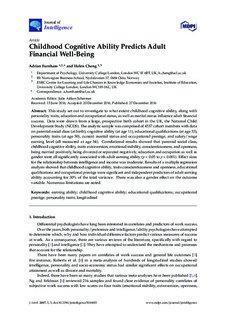Childhood Cognitive Ability Predicts Adult Financial Well-Being
Journal article, Peer reviewed
Published version
Permanent lenke
http://hdl.handle.net/11250/2465831Utgivelsesdato
2017Metadata
Vis full innførselSamlinger
- Publikasjoner fra CRIStin - BI [1015]
- Scientific articles [2181]
Sammendrag
This study set out to investigate to what extent childhood cognitive ability, along with personality traits, education and occupational status, as well as marital status influence adult financial success. Data were drawn from a large, prospective birth cohort in the UK, the National Child Development Study (NCDS). The analytic sample was comprised of 4537 cohort members with data on parental social class (at birth), cognitive ability (at age 11), educational qualifications (at age 33), personality traits (at age 50), current marital status and occupational prestige, and salary/wage earning level (all measured at age 54). Correlational results showed that parental social class, childhood cognitive ability, traits extraversion, emotional stability, conscientiousness, and openness, being married positively, being divorced or separated negatively, education and occupation as well as gender were all significantly associated with adult earning ability (p < 0.05 to p < 0.001). Effect sizes for the relationship between intelligence and income was moderate. Results of a multiple regression analysis showed that childhood cognitive ability, traits conscientiousness and openness, educational qualifications and occupational prestige were significant and independent predictors of adult earning ability accounting for 30% of the total variance. There was also a gender effect on the outcome variable. Numerous limitations are noted.
